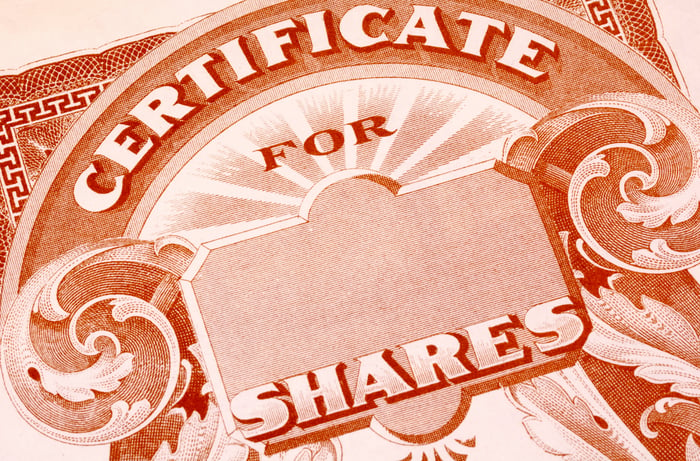There has been no shortage of news events to keep investors busy this year. The coronavirus pandemic, historically high inflation, and the invasion of Ukraine by Russia, are just some of the major market-moving events.
But among the many catalysts captivating Wall Street, stock split-mania has seemingly risen to the top of the list.
A stock split is a way for publicly traded companies to alter their share price and outstanding share count without affecting their market cap or underlying business. It's an aesthetic move that primarily benefits retail investors who may not have access to fractional-share purchases. When high-flying stocks split their shares, they're simply lowering their share price to make it more affordable (on a nominal basis) for retail investors.

Image source: Getty Images.
Four industry titans have announced stock splits
Since the beginning of February, four supercharged and widely owned stocks announced their intentions to enact stock splits, with shareholder approval.
- Alphabet (GOOGL 0.55%) (GOOG 0.74%), the parent company of leading internet search engine Google and streaming platform YouTube, kicked things off in early February by announcing plans to split its shares 20-for-1. If approved by shareholders, the split will take effect in mid-July.
- Amazon (AMZN -1.64%) was up next. On March 9, the e-commerce giant followed in Alphabet's footsteps with a 20-for-1 stock split announcement of its own. Amazon's split will take effect in early June if its shareholders give it the go-ahead.
- Tesla (TSLA 12.06%) charged forward next. In late March, the electric vehicle behemoth announced its intent to enact a stock split for the second time since August 2020. Although Tesla didn't unveil the magnitude of its proposed split (the August 2020 split was 5-for-1), it did note that shareholders would vote on its approval during the company's annual shareholder meeting later this year.
- Shopify (SHOP -2.37%) became the newest highflier to jump on the stock split bandwagon. This cloud-based e-commerce solutions powerhouse intends to split its stock 10-for-1. If shareholders give Shopify the green light, its split would take effect in late June.
Because stock splits are often enacted by companies that are firing on all cylinders, their announcement tends to evoke positive emotions from investors. It's also left Wall Street and investors wondering what high-flying stocks are next to announce a split after Alphabet, Amazon, Tesla, and Shopify.

Image source: Getty Images.
Costco Wholesale
The first highflier that would be an incredibly logical stock split candidate is warehouse club Costco Wholesale (COST 0.17%). The last time shares of Costco split was over 22 years ago.
As of the closing bell on April 14, Costco's shares were setting investors back more than $590 a pop. While that's not a big deal for investors with access to fractional-share purchases, $590 is a prohibitively high figure for an investor who might want to put $100, $200, or $500 to work in a widely known retail company. Splitting its shares would almost certainly broaden interest and ownership in the company.
Another obvious reason for Costco to consider a split is because its stock is outperforming. Shares of the company have soared 584% over the trailing 10 years and are likely to head higher over time as its competitive advantages play out.
For instance, Costco's size and deep pockets allow the company to purchase goods in bulk. Buying in bulk often lowers the cost paid per unit, which translates into better prices for its members. Being able to undercut many traditional grocers on price, and counting on its members to add discretionary items to their shopping carts, has been a winning formula for quite some time for Costco.
Costco's membership model is working wonders, too. The annual fees Costco collects from its members further buffer its operating margins and provide added incentive for members to make Costco their primary place to shop.
Image source: Getty Images.
Broadcom
A second high-flying stock that could be next to join Alphabet, Amazon, Tesla, and Shopify is semiconductor solutions provider Broadcom (AVGO 0.61%). Although Avago, which acquired Broadcom in 2016 and kept the Broadcom name, has never split its stock, Broadcom did enact three splits between 1999 and 2006.
Similar to Costco, shares of Broadcom are pricey for retail investors. Shares closed this past week at almost $574, and it's been roughly six months since investors have had the chance to purchase a single share for below $500. Over the trailing 10 years, Broadcom shares have rallied in excess of 1,400%! And yet, they could head even higher.
Broadcom is the definition of a company that's firing on all cylinders. It's expected to see demand remain high for its wireless chips, which are used in next-generation smartphones. The rollout of 5G wireless infrastructure by telecom companies will take time, meaning Broadcom can benefit from a multiyear smartphone replacement cycle.
Beyond smartphones, the company has ample opportunity to grow its presence in data centers. With businesses shifting their data into the cloud at an accelerated pace due to the pandemic, demand has been strong for Broadcom's access and connectivity chips used in data centers.
Considering that Broadcom is booking production well into 2023, there's a good chance of its share price heading even higher. That should put a stock split in play for this semiconductor solutions powerhouse.

Image source: Getty Images.
Palo Alto Networks
A third and final highflier that would be a common-sense stock split candidate right now is cybersecurity company Palo Alto Networks (PANW 0.11%). Palo Alto became a publicly traded company almost 10 years ago and has never split its stock.
To keep the theme going, Palo Alto's current share price can make it difficult for some retail investors to buy its stock. The company ended last week at almost $627 a share, which makes it the highest-priced company (based on nominal share price) on this list. Since its initial public offering in the summer of 2012, Palo Alto's stock has gained more than 1,070%!
The beauty of cybersecurity stocks is that they've evolved into a basic-necessity service over the past two decades. No matter how well or poorly the U.S. economy and/or stock market are performing, hackers and robots don't take a day off from trying to steal consumer and enterprise data. This makes cybersecurity solutions a veritable necessity for businesses of all sizes. It also increases the likelihood that Palo Alto's stock will head higher over time.
What makes Palo Alto so intriguing is the company's ongoing shift to subscription-based solutions. While the company hasn't abandoned its traditional firewall products, it should become more competitive and offer more effective cybersecurity solutions by focusing on cloud-based subscription services. Annual recurring revenues from these next-gen solutions are expected to grow from $1.18 billion in fiscal 2021 to an estimated $3.25 billion by fiscal 2024 (Palo Alto's fiscal year ends July 31).
Palo Alto is also relying on bolt-on acquisitions to broaden its product and service portfolio and reach new customers. With its future looking bright, a stock split would make a lot of sense.





